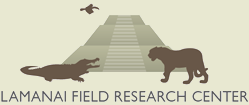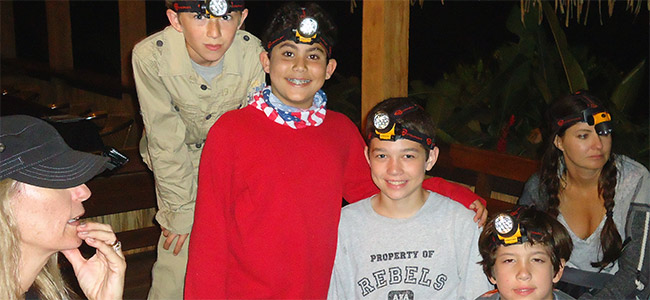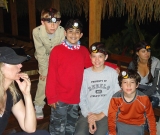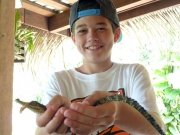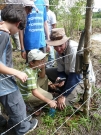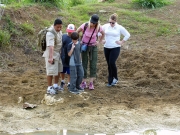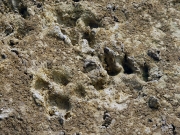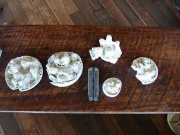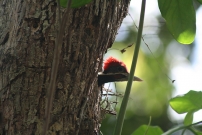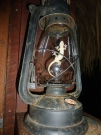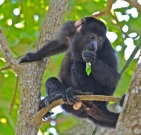“Every one can make a difference… Everyone… Together… Can change the world.” This is what KidsEcoClub is all about and on their field trip to LFRC this spring we learned just how motivated these youngsters really are! The group was a mélange of members of the KidsEcoClub National Green Youth council which included five middle schoolers, one high school student, a graduate student from Scripps Institute of Oceanography, two mothers, a middle-school science teacher, and a college professor.
Kids EcoClub was founded by nine-year old, Max Guinn, now 11 and his mother, Susan Guinn, to provide environmental education programs for K-12 schools to increase eco-consciousness in children and their communities. Both co-founders were part of the visiting group. By choosing LFRC, the energetic group was exposed to real science projects in progress and learned some of the tools and techniques to collect data in the field, be it on plants, insects, crocodiles, wild cats, or frogs. The group listened to a presentation on our current projects at LFRC and had so many questions that the discussion continued well into dinner. The students (and their adult chaperones) accompanied us to check for any big cat activity on a nearby landowner’s property and were delighted to find not one, but the fresh paw prints of at least three different cat species at a watering hole on the edge of the property. With the dry season approaching, water would become a limited supply for resident wildlife, and already the pond was shrinking. This presented the opportunity for Max and his teammates to assist with making plaster casts of the prints. The prints were fresh and deep and casting was a success so much so that each middle-schooler left with his very own cast of a wildcat’s paw. Clearly, wild cats piqued the interest of the students and they were eager to check camera traps that showed indeed at least one cat was caught on camera not too far away from the watering hole full of prints. Crocodiles, however, were a close second as the group learned the proper way to catch a juvenile croc from an airboat and collect relevant data on its body condition. The group noted the rich biodiversity of the tropics whilst at LFRC and was exposed to unique experiences in the field that they would not find in their native California. Members of KidsEcoClub left feeling inspired and motivated to do more in the name of science…to save planet earth.
Read about Max’s LFRC adventure in his own words at http://www.kidsecoclub.org/kidsite/Columns.aspx. To learn more about KidsEcoClub, visit http://www.kidsecoclub.org/.
